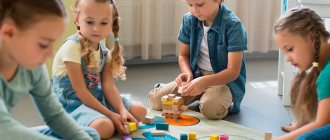Gender education of preschoolers in a kindergarten
Author: Shapovalova Olga Viktorovna
Topic: Gender education of preschool children in a kindergarten
Explanatory note
The problem of raising and educating a child in accordance with his gender is an urgent task of pedagogical work with preschool children. Social changes taking place in modern society have led to the destruction of traditional stereotypes of male and female behavior. Against the background of these changes, the internal psychological positions of children and their consciousness also change: girls become aggressive and rude, and boys adopt a feminine type of behavior. Observing children, you can sometimes see that girls lack modesty, tenderness, patience, and do not know how to peacefully resolve conflict situations. Boys, on the contrary, do not know how to stand up for themselves, are physically weak, lack stamina and emotional stability, and they lack a culture of behavior towards girls. The content of children's games is also alarming: children demonstrate patterns of behavior that do not correspond to the gender of the child, and do not know how to negotiate in the game or assign roles. In addition, during work, children do not always know how to independently distribute responsibilities, taking into account the gender of their partner.
Children's activity cannot be complete on a purely verbal level, outside the objective environment, otherwise the child will lose the desire to learn new things, and apathy and aggression will appear. The same sensations arise in parents when the subject environment is dull, gray and unattractive. The surrounding space, which meets the requirements of the current immediate and long-term creative development of each child, and contributes to the timely identification and development of his abilities, will help to avoid the manifestation of such negative feelings.
Despite all the difficulties of pedagogical work, it is very important for the teacher to be an individual, to have a high moral, cultural and professional level, to be an optimist, because “personality shapes personality.”
Relevance of gender education
is currently enormous, since modern society is categorically against men and women having only a set of advantages based on their gender.
Gender education in preschool educational institutions calls for the fact that we all want boys to demonstrate not only unbending will and muscles. We also wish that boys and men would show kindness depending on the situation, be soft, sensitive, be able to demonstrate care towards other people, and respect family and friends. And women would be able to express themselves, build a career, but at the same time not lose their femininity.
The real way out of this sad situation is targeted gender education, both in kindergarten and at home. Targeted education provided to a girl or boy in preschool age will significantly affect the development of personality. And it will allow girls and boys to develop those personality traits that will allow them to be successful in modern society.
The biggest role of gender education in the family is to ensure that men do not lose the ability to play the right role in the family, do not transform from the main breadwinner into the main consumers and do not shift the upbringing of children onto women’s shoulders. Well, women, in turn, would not become simply creatures without gender.
Nowadays, many children associate their gender with precisely this distorted behavior: girls become straightforward and rude, and boys adopt the type of behavior of the women who surround them at home and in the garden, clinic, etc. Observing children, you can notice that many girls lack tenderness, sensitivity and patience, and do not know how to resolve conflicts peacefully. Boys, on the contrary, do not try to stand up for themselves, are physically weak, have little endurance and are emotionally unstable.
Modern little knights are completely alien to any kind of culture of behavior towards girls. There is also concern that the content of children's games demonstrates behavior patterns that do not correspond to the child's gender. Because of this, children do not know how to negotiate in games and assign roles. Boys rarely show a desire to come to the aid of girls when physical strength is needed, and girls do not strive to help boys where thoroughness, accuracy, care are needed, these are the games for gender education.
Therefore, gender education in kindergarten and in the family is simply necessary for the development and socialization of a child in our society.
Target:
increasing professional level on the topic, systematizing work on the use of a gender approach in raising children in preschool educational institutions.
Tasks:
- get acquainted with theoretical knowledge about the psychosocial differences between boys and girls, the characteristics of their upbringing and education;
- organize the educational process with children in a group, taking into account gender characteristics;
- contribute to the development of gender competence in parents.
Calendar-thematic planning of work with children
| Period | Subject | Target | Content |
| September | “Look what I am!” | Learn to identify with members of your own gender. Form ideas about yourself as a unique, valuable, inimitable personality | • Didactic game “Dress the doll.” • Drawing “My portrait”. • Working with the mirror “My Emotions”. • Guessing riddles about body parts |
| October | "Who is who" | Develop the ability to correlate one’s gender-role behavior with the behavior of others, adequately assess the gender-role behavior of peers and one’s own | • Dramatization of the fairy tale “Ryaba Hen” • Reading “Two comrades walked through the forest...” by L. Tolstoy with discussion. • Teacher’s story “Rules in our group” |
| November | "I am among others" | Develop ideas about other people based on comparing yourself with them, highlighting similarities and differences. Cultivate friendly relationships | • Outdoor game “Traps in pairs”. • Didactic game “Describe the one on the right...” • Learning songs about friendship. • Watching the cartoon “Cheburashka” • Constructing a “House for Friends” from building material |
| December | "I and my family" | Create conditions for the implementation of knowledge about the standards of “male” and “female” behavior in play and real relationships with peers. To form ideas about the role and employment of men and women in the family | • Exhibition of family photographs. • Role-playing games “Waiting for Guests”, “Hospital” • Drawing “My Family” • Watching cartoons “Bag of Apples”, “Three from Prostokvashino”, “Cat’s House” |
| January | "Who am I?" | Form ideas about “female” and “male” activities, external and internal aspects of masculinity and femininity | • Lotto “Professions” • Reading the story “How I Was a Mother” by J. Segel. • Didactic game “Women’s and men’s work” • Excursions to a construction site, to a hairdresser. • Working with pictures “Manners of behavior” |
| February | “What are boys made of?” | Form an emotionally positive attitude towards fulfilling a future social role | Reading the poem by E. Uspensky “If I was a girl.” Reading “The Story of an Unknown Hero” by S. Marshak. Conversation on the story “The Knight” by V. Zheleznikov. Application “Gift for Dad” for Defender of the Fatherland Day |
| March | "Girls' World" | Foster a culture of communication with partners of the opposite sex. Continue to teach how to be neat: to see and eliminate flaws in your appearance in your hair, clothes, etc. | Joint work with distribution of responsibilities “Let’s wash the doll’s clothes.” Application “Postcard for Mom”. Didactic game “Dress the doll to the theater, store, disco...” Development of fine motor skills: “We make decorations with our own hands” |
| April | "I was born!" | Continue to form ideas about the birth of a new life with a general mechanism of childbirth | Didactic game “Who was who?” Guessing riddles about animals and their babies. Role-playing games “Mothers and Daughters”, “Family”. Teacher's story “How animals care for their young” using illustrations. |
| May | "I am among strangers" | Continue to familiarize children with the rules of behavior in society. | Reading the work “How a Boy Got Lost” 3 by Alexandrova. Watching the cartoon "Masha and the Bear" with discussion. Role-playing game “Cafe” (learning the rules of good manners) |
Working with parents
.
September
Folder: “Gender education in kindergarten: what is it and why?”
October
Consultation “Family is the main factor in the development of a child’s gender identity”
November
Tips for raising your daughter: “How to raise a girl”
December
Advice to parents on raising sons: “Psychological development of boys.”
January
Recommendations for didactic games on gender education.
February
Memo: “Raising boys and girls in Russian traditions.”
March
Photo competition: “Dad with child” and “Mother with child”
April
Parents' meeting "For parents about raising girls and boys."
May
Questionnaire on gender education for parents.
comments powered by HyperComments
Bibliography
- Bozhovich L.I. Problems of personality formation. - Moscow: Education, 1995.
- Bodaleva A.A. Formation of ideas about another person as a person. - M., 2002.
- Vygotsky, L.S. Collected works. - Moscow: Education, 1984.
- "Preschool pedagogy". Edited by V.I. Yadeshko and F.A. Sokhina.
- Weekly “School Psychologist” No. 22/2000 6.
- Kosheleva A.D. Emotional development of a preschooler. - M.: Education, 1985.
- Lebedinsky V.V. and others. Emotional disorders in childhood. M., Publishing house Mosk. Univ., 1991.
- Lisina M.I. Problems of ontogenesis of communication. - M., Pedagogy, 1986.
- Mukhina V.S. Age-related psychology. - M., 1999.
- Features of self-control in hyperactive children of senior preschool age. - M., 1994. 11. Development of communication in preschoolers / Ed. Zaporozhets A.V., Lisina M.I. - M. 1964.
- Smirnova E.O. Features of communication with preschoolers: Textbook. - M.: Publishing House, 2000.
- Smirnova E.O. Formation of interpersonal relationships in early ontogenesis. // Questions of psychology. 1994.- No. 6. P. 5-15.
- Galiguzova L.N. Interpersonal relationships of a child from birth to seven years. - Modek Publishing House, 2001. 15.
- Interpersonal relationships of preschool children. Diagnostics. Problems. Correction. - M.: Vlados, 2005.
- Smirnova E.O., Khuzeeva G.R. Aggressive children. Preschool education No. 4, 2003. Education", Moscow, 1978.
- Uruntaeva G.A. Preschool psychology: A textbook for students of special educational institutions. - M.: "Academy", 1996. - 336 p.
- Flake-Hobson K., Robinson B.E., Skeen P. Development of the child and his relationships with others. - M.: Center for Universal Human Values, 1993.
Questions to reinforce the topic:
1) At what age does the process of gender identification occur? 2) When does gender identity begin to form? 3) What are the stages of formation of gender identity? 4) What is the essence of S. Bem’s concept of gender schema. 5) What types of gender-role behavior are identified by L. Semenova? Describe them. 6) How the gender characteristics of junior schoolchildren were studied by A. Chekalina. 7) What happens to the formation of gender identity in adolescence and adolescence. What gender intrapersonal conflicts are observed in “adult life”? 9) What is the essence of the “empty nest syndrome”.
2) When does gender identity begin to form? 3) What are the stages of formation of gender identity? 4) What is the essence of S. Bem’s concept of gender schema. 5) What types of gender-role behavior are identified by L. Semenova? Describe them. 6) How the gender characteristics of junior schoolchildren were studied by A. Chekalina. 7) What happens to the formation of gender identity in adolescence and adolescence. What gender intrapersonal conflicts are observed in “adult life”? 9) What is the essence of the “empty nest syndrome”.
Issues for discussion:
1. Sandra Bam's concept of gender schema. Formation of sexual identity in children of different ages. 2. Characteristics of feminine, masculine, androgynous, undifferentiated children, features of their behavior. 3. Psychological portraits of “adequate” and “ambivalent” children. 4. Gender characteristics of middle-aged representatives from the perspective of experiencing conflicts.
Practical tasks. 1. Select your own everyday or literary illustrations for the types of child behavior discussed in this section. 2. Watch children of different sexes play. What is the nature of games for children of different genders, what roles do they choose in them?




